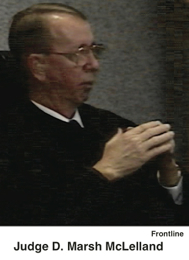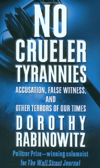Rascals case in brief
In the beginning, in 1989, more than 90 children at the Little Rascals Day Care Center in Edenton, North Carolina, accused a total of 20 adults with 429 instances of sexual abuse over a three-year period. It may have all begun with one parent’s complaint about punishment given her child.
Among the alleged perpetrators: the sheriff and mayor. But prosecutors would charge only Robin Byrum, Darlene Harris, Elizabeth “Betsy” Kelly, Robert “Bob” Kelly, Willard Scott Privott, Shelley Stone and Dawn Wilson – the Edenton 7.
Along with sodomy and beatings, allegations included a baby killed with a handgun, a child being hung upside down from a tree and being set on fire and countless other fantastic incidents involving spaceships, hot air balloons, pirate ships and trained sharks.
By the time prosecutors dropped the last charges in 1997, Little Rascals had become North Carolina’s longest and most costly criminal trial. Prosecutors kept defendants jailed in hopes at least one would turn against their supposed co-conspirators. Remarkably, none did. Another shameful record: Five defendants had to wait longer to face their accusers in court than anyone else in North Carolina history.
Between 1991 and 1997, Ofra Bikel produced three extraordinary episodes on the Little Rascals case for the PBS series “Frontline.” Although “Innocence Lost” did not deter prosecutors, it exposed their tactics and fostered nationwide skepticism and dismay.
With each passing year, the absurdity of the Little Rascals charges has become more obvious. But no admission of error has ever come from prosecutors, police, interviewers or parents. This site is devoted to the issues raised by this case.
On Facebook
Click for earlier Facebook posts archived on this site
Click to go to
Today’s random selection from the Little Rascals Day Care archives….
Click for earlier Facebook posts archived on this site
Click to go to
Today’s random selection from the Little Rascals Day Care archives….
What caused ‘inability to think straight’?
Aug. 29, 2012
“Los Angeles County’s Satanic Abuse Task Force, an official sub body of the Los Angeles County Women’s Commission, concluded (in 1992) that Satanists were trying to pump diazinon poison into their office and home air vents in order to silence them. Task force members became suspicious, according to president Myra Rydell, after experiencing bouts of profound exhaustion, headaches and, perhaps most significantly, ‘the inability to think straight.’
“McMartin parent Jackie McGauley, also a task force member, told a reporter that, according to her doctor, diazinon would be ‘virtually impossible to detect’ if given in small doses over a long time period. The County’s epidemic specialist said that diazinon was easy to detect and after his own investigation called the claims ‘outrageous.’”
– From “The Dark Truth About the ‘Dark Tunnels of McMartin’” by John Earl (IPT Journal, 1995)
No single reason accounts for the country’s belated skepticism about ritual abuse, but the poison-gas episode in Los Angeles surely qualified as a “jump the shark” moment.
Convictions overturned, judge angrily exited
 July 5, 2014
July 5, 2014
“The Burlington judge who has presided over the the Little Rascals Day Care Center case since 1990 resigned in disgust the day after the state Supreme Court refused to review (the overturning of) two convictions.
“D. Marsh McLelland, a retired Superior Court judge, said in a letter dated Sept. 8 that the court’s refusal to review the cases ‘is legally and morally reprehensible.’
“McLelland’s letter to Chief Justice Burley Mitchell said the refusal to review a Court of Appeals order for a new trial raised the term technicality to new heights….”
– From “Judge quits Little Rascals case” from the Associated Press (Sept. 22, 1995)
I imagine that the “technicality” comment was from a direct quote, although I haven’t been able to find either McLelland’s original letter or a more substantial account. It’s no wonder he felt humiliated – the Court of Appeals decision had laid bare his indifference to the rights of the defendants.
Regardless, McLelland’s resignation proved irrelevant, as prosecutors decided not to retry Bob Kelly and Dawn Wilson.
Just what McMartin case needed: More hysteria!
 Nov. 4, 2015
Nov. 4, 2015
“(Psychiatrist Roland) Summit praised the hysteria-induced news media hype and community gossip (about the McMartin Preschool case) as a public service: Without that type and extent of press coverage, the researchers and other professionals would not be able to gather this information and would be trapped by old myths about child sexual abuse.
“Summit complained that investigators were limiting the ability of parents to cope by discouraging them from meeting and discussing the case. The community’s priority, he explained, should be to support the children. Hundreds of children had escaped sexual assault, he claimed, because of the publicity about the McMartin case.”
– From “Childhood Sexual Abuse: A Reference Handbook” by Karen L. Kinnear (2007)
The “satanic ritual abuse” day-care myth had no more enthusiastic – and effective – pitchman than Roland Summit, who conjured up the Child Sexual Abuse Accommodation Syndrome, who spread the gospel as far as New Zealand and who never ever gave up on the existence of the McMartin tunnels.
Although Summit himself never made it to Edenton, his ill-conceived cosmology arrived full-blown.
In the beginning, there was a paranoid schizophrenic
Nov. 11, 2011
 “The first case to raise alarms about predators in nursery schools was that involving the McMartin preschool in Manhattan Beach, California…. In 1983, a woman named Judy Jones charged that 25-year-old Ray Buckey, a teacher and grandson of the school’s founder, had sodomized her two-year-old son.
“The first case to raise alarms about predators in nursery schools was that involving the McMartin preschool in Manhattan Beach, California…. In 1983, a woman named Judy Jones charged that 25-year-old Ray Buckey, a teacher and grandson of the school’s founder, had sodomized her two-year-old son.
“(Jones) was an alcoholic and subsequently diagnosed as a paranoid schizophrenic.
“After her charge against Buckey (who was acquitted in 1990 along with his mother and school owner Peggy McMartin Buckey), she went on to make the same allegations against a member of the U.S. Marine Corps who had, she said, sexually assaulted her dog.”
– From “No Crueler Tyrannies: Accusation, False Witness and Other Terrors of Our Times” by Dorothy Rabinowitz (2003)
When Rabinowitz, a member of the Wall Street Journal editorial board, won the 2001 Pulitzer Prize for commentary, the judges cited her series on unjustified child-abuse prosecutions.











0 CommentsComment on Facebook